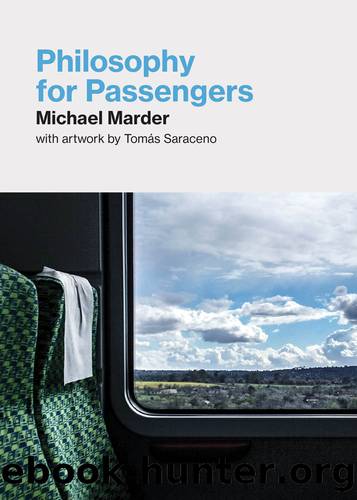Philosophy for Passengers by Michael Marder

Author:Michael Marder [Marder, Michael]
Language: eng
Format: epub
Publisher: MIT Press
Stop no. 6: Metaphor
Metaphor is a unique means of transport. As a matter of fact, the word metaphor says, precisely, transportâonly in Greek, instead of Latin. Metaphors are the vessels of meaning that let it swiftly glide on the waters of sense. More often than not, they stand in sharp contrast to literalness, which allegedly denotes the fixity of meaning, its inability to travel anywhere beyond the site of its enunciation or inscription. The literal sticks to the bareness of what is expressed, to the self-proclaimed basic and original truth of expression; the metaphoric passes from a certain kind of object or idea to ideas and objects of a different kind, from one order of meaning to another.
Iâve always had strong doubts about the wisdom and the plausibility of hard and fast distinctions between literalness and metaphoricity. Would these distinctions themselves be literal or metaphoric? Further, to arrest meaning in its literal straitjacket is to interfere with its vital operations that depend on its instability and motility. Meaning-making only works if, addressed to others, the message travels, changing hands, mutating, inviting fresh interpretations and modes of reception at each stop along its itinerary. Metaphoric drift may be inseparable from this dynamism, which I earlier called âour sense of sense, the paradigm of meaning in perpetual motion.â For its part, a strict opposition between the literal and the metaphoric rehashes the philosophical mind/body split, with the proviso that, in this instance, oneâs preference goes to the embodied and the concrete at the expense of metaphor taken as mere whim, a caprice of the imagination.
Are the passengers we have been musing about metaphorical? Yes and no. The figure of the passenger includes you and me in our daily routines of moving about and relating to the world. But, in so doing, this figure reaches beyond the actual instances of train rides or commercial flights to an existential predicament, in which we are accustomed to perceive reality, to experience time, places, and ourselves as though we have never gotten off the train nor deplaned. The transfer of a passenger mindset to other situations in life that, on the face of things, have nothing in common with means of transport slots it between literal and metaphoric significations. If, from time to time, we are all passengers, and if we unconsciously play the role of passengers both before and after we get on or off the proverbial bus, then the register of such thinking is mixed: literal-metaphorical or metaphorico-literal.
Much of my work has occupied the gray (what a misnomer! anything but gray, it is vibrant and multicolored) area between literalness and metaphoricity. From dust to fire, from plants to the dump, I have sought figures of thought and existence, through which the categories of the old metaphysical philosophy could be sifted and transformed beyond recognition. Figuration is what abstract modes of cogitation are allergic to; the thrust of abstraction may be defined as that of a generalized un- or disfiguration. As far as the philosophy
Download
This site does not store any files on its server. We only index and link to content provided by other sites. Please contact the content providers to delete copyright contents if any and email us, we'll remove relevant links or contents immediately.
| Anthropology | Archaeology |
| Philosophy | Politics & Government |
| Social Sciences | Sociology |
| Women's Studies |
The Leavers by Lisa Ko(6460)
Born to Run: by Christopher McDougall(6250)
iGen by Jean M. Twenge(4693)
Sapiens by Yuval Noah Harari(4528)
The Kite Runner by Khaled Hosseini(4415)
Spare by Prince Harry The Duke of Sussex(4188)
Bullshit Jobs by David Graeber(3171)
Livewired by David Eagleman(3113)
Goodbye Paradise(2949)
Never by Ken Follett(2871)
A Dictionary of Sociology by Unknown(2516)
Harry Potter 4 - Harry Potter and The Goblet of Fire by J.K.Rowling(2413)
The Club by A.L. Brooks(2350)
People of the Earth: An Introduction to World Prehistory by Dr. Brian Fagan & Nadia Durrani(2345)
The Social Psychology of Inequality by Unknown(2304)
Machine Learning at Scale with H2O by Gregory Keys | David Whiting(2263)
Harry Potter and the Order of the Phoenix (5) by J.K. Rowling(2224)
0041152001443424520 .pdf by Unknown(2214)
Harry Potter and the Deathly Hallows (7) by J.K. Rowling(2213)
